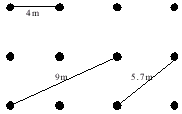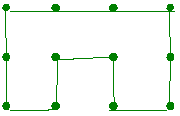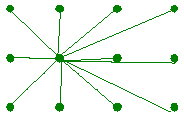|
The topology represents the physical
or logical arrangement of network stations in a local area network
in relation to each other.
(a) What are the characteristics of
a Local Area Network? [6]
(a) Limited geographical communications area
[1]
Moderate data rates ranging from 1 to 100 Mbps[1]
Dedicated physical communications channel[1]
Peer-to-peer communications[1]
Low-error rate[1]
Owned and operated by a single entity[1]
(b) Give an advantage and a disadvantage
of using the bus topology. [2]
(b) Advantage - not vulnerable to single
point of failures[1]
Disadvantage - complex access control problem because single media
is
used in a multi-access control problem[1]
(c) What is the main difference between
broadband and baseband Networks? [1]
(c) Baseband networks is use digital signaling(or
transmit and receive
unmodulated signals) while broadband networks use analog signaling
technique(modulated signals)[1]
(d) A LAN implementation is being planned
for an office. The nodes are to be
placed in a 3 x 4 grid, spaced as shown below (diagonal lengths are
rounded for
ease of calculation).

What is the minimum amount of cable that
would be needed for the following
topologies:
i) Bus
(ii) Ring
(iii) Star [6]
(d) (i) Bus 4m X 11 = 44m [1] diagram, or
other explanation of
calculation [1]

(ii) Ring 4 X 12 = 48m [1] diagram, or other explanation [1]

(iii) Star (4 x 4) + (1 x 8) + (4 x 5.7) + (2 x 9) = 64.8m [1] diagram,
or
other explanation[1]

In each case, working needs to be shown to achieve full marks: either
formulae or diagrams. Do not penalise the same error twice in different
question parts.
|



